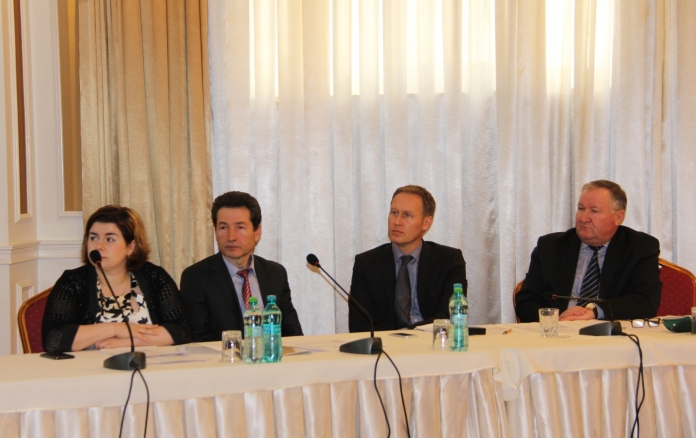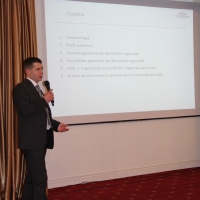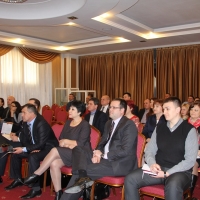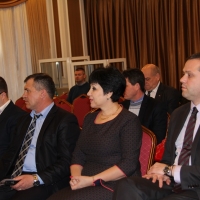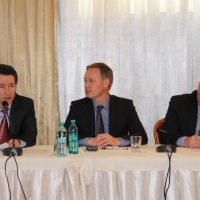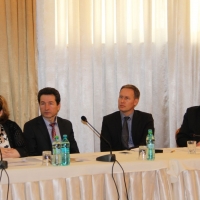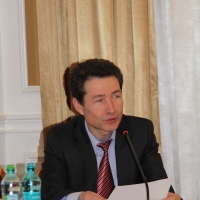Respondents of a countrywide representative survey are quite aware of the regional development activities carried out by the Ministry of Regional Development and Construction (MRDC) and the North, Centre and South Regional Development Agencies (RDAs). Thus, over half of respondents consider the National Fund for Regional Development (NFRD) to be an effective tool for regional development policy-making, notwithstanding that it only amounts to 1% of the national public budget. Almost two-thirds of the local public authorities involved in the regional planning and programming process show satisfaction with the Regional Development Agencies’ performance in this context.
The findings are contained in the sociological survey entitled ‘Degree of Stakeholders’ Satisfaction with Regional Development Agencies’ Capabilities to Effectively Facilitate the Regional Development Process’ that has been launched at the roundtable held on 23 March 2015. The survey was undertaken at the request of the German Development Cooperation through GIZ, under the ‘Modernization of Local Public Services in Moldova’ project.
The research was conducted by the Centre for Sociological, Political and Psychological Analysis and Investigation (CIVIS), using a nationwide representative sample of 798 persons in 32 rayons and the Bălți municipality. Respondents were selected as two target groups: direct beneficiaries (persons directly involved in the regional sectoral planning and programming process) and indirect beneficiaries (persons not directly involved in the mentioned process). The survey itself took place from October to November 2014.
‘The findings are interesting, reflecting the extent to which we use the correct mechanisms and tools. This will be really helpful in designing the new Regional Development Strategy for the years 2016-2020’, said the GIZ Country Director for Moldova, Philipp Johannsen.
‘Regional Development Agencies are very open to survey findings and recommendations, and I am sure that the lessons learned will be taken into consideration. The fact that we saw beneficiaries’ perception towards regional development will help us become more efficient’, said the representative of the Ministry of Regional Development and Construction, Valerian Bînzaru, who was present at the launch of the survey.
Respondents appear generally satisfied with the regional development process, and consider it as being driven in a positive direction.
Based on the issues set forth by both direct and indirect beneficiaries, as well as the wording of their expectations with respect to various aspects of the regional development process (management, human resources, financial resources, information, capacity-building), the study provides the following recommendations:
- Providing better and more uniform information to local decision makers and the general public regarding various aspects of regional development;
- Continuous training, along with evaluation of activities of human resources involved in the process;
- Ensuring greater cooperation between actors involved in the regional development process (public sector – private sector – civil society);
- Ensuring the correctness of the decision-making process with respect to localities where projects will be implemented;
- Transparency in the management of financial resources;
- Developing and implementing effective mechanisms for monitoring the regional development process.
In the area of regional planning and programming, the GIZ project has supported Regional Development Agencies in the development of Regional Sector Programmes focusing on 4 major fields:
- Water Supply and Sanitation
- Integrated Solid Waste Management
- Energy Efficiency in Public Buildings
- Regional and Local Roads
These documents constitute an operational tool for regional planning, while incorporating the development needs of the sector concerned. At the same time, with GIZ support, project portfolios are developed in the 4 major fields, after having been selected by local communities on a participatory basis. Subsequently, on the basis of criteria developed by experts in the sector, an Inter-Ministerial Committee selects the viable project concepts, which will subsequently be developed so as to be prepared for funding. Thus, project portfolios are an excellent tool for attracting investments in the Republic of Moldova’s development regions.
The ‘Modernization of Local Public Services in Moldova’ project is implemented by GIZ with financial support from the German Federal Ministry for Economic Cooperation and Development (BMZ), the Swedish International Development Cooperation Agency (Sida), the Romanian Ministry of Foreign Affairs and the European Union.
Acces here the report in English.


